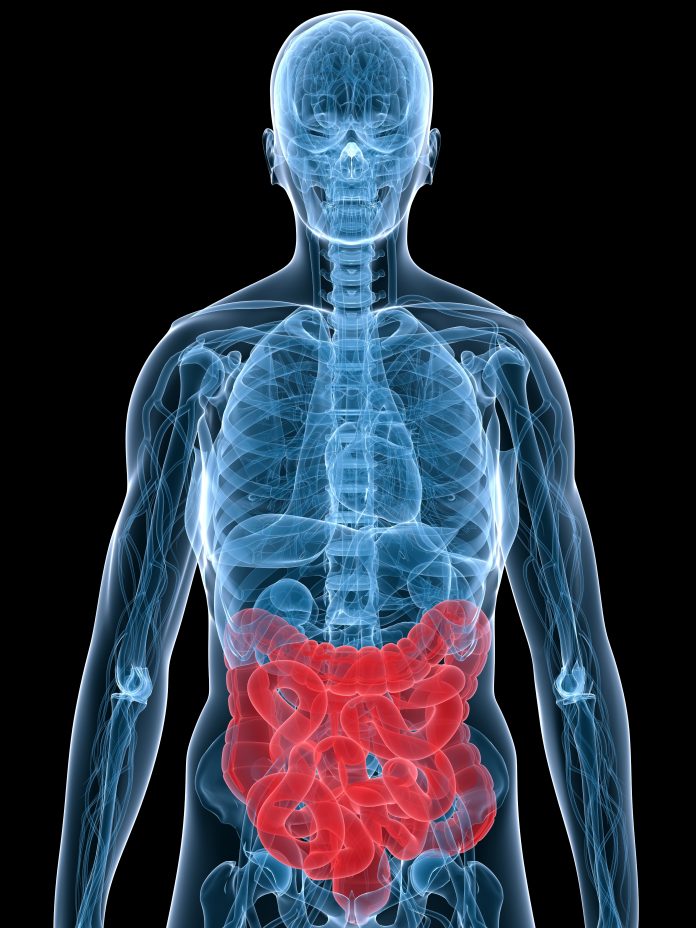With more than 100,000 Australians living with inflammatory bowel disease (IBD), an umbrella term used to describe disorders that involve chronic inflammation of the digestive tract, research has isolated five strains of gut bacteria that could pave the way for new IBD treatments and potentially help prevent some forms of bowel cancer.
The study by University of Queensland (UQ) and Mater researchers identified gut bacterial strains that suppress inappropriate gut inflammation and debilitating IBD symptoms.
IBD is a chronic condition characterised by relapsing gut inflammation believed to be caused by an abnormal gut bacterial composition that produces an immune response in genetically susceptible people, resulting in severe symptoms.
Associate Professor Jake Begun, IBD Group Leader in the Immunity, Infection and Inflammation Program at Mater Research Institute -UQ, says his team isolated bacteria found in the healthy gut and identified several species that produced a range of anti-inflammatory substances.
“While the gut microbiome is made up of trillions of bacteria that have co-evolved with humans over time, our lab tests identified five strains that were able to suppress inflammation in blood and tissue samples from IBD patients,” he said.
“Furthermore, one of these healthy gut bacterial strains produced anti-inflammatory substances that were able to reduce disease severity in a pre-clinical model by inhibiting one of the master molecular regulators of inflammation, called NF-kB, without causing any side-effects.”
Mater Research-UQ PhD candidate Rabina Giri says the research found good bacterial strains inhibited the pro-inflammatory enzyme NF-kB by about half.
“Most importantly, this was enough to suppress inflammation but didn’t cause any side effects in animal models,” she said.
“Our findings could pave the way for the development of therapies for IBD that are based on the natural substances produced by ‘good’ gut bacteria, which may prove to be safer than existing drugs.”
Challenging condition
IBD has two predominant subtypes: Crohn’s disease and ulcerative colitis.
About one in five people whose disease affects their colon develops colorectal cancer – which is double the rate in the general population.
Patients are generally treated with potent drugs that suppress the immune system in a bid to relieve symptoms, but these drugs only work for about 50 per cent of patients, says Dr Begun.
“Medical regimens can be challenging to keep track of for patients, and any assistance and education provided can be valuable,” he advised pharmacists.
“Because existing therapies, even biologic drugs, are only successful at attaining remission in approximately one-third of patients, adjustment of medication doses and classes is frequently required.”
Given IBD’s significant morbidity and high rates of disability, the findings of this latest research are exciting, Dr Begun says, but he adds that it’s also important to remember that lifestyle choices can drastically reduce a person’s risk of developing IBD and bowel cancer.
“Studies show that diets rich in fibre and low in refined sugar, ultra-processed food, and processed meat can reduce the risk of IBD and bowel cancer,” he said.
“Early detection and treatment are associated with the best outcomes in colorectal cancer, so [people should] also be sure to participate in the National Bowel Cancer Screening Program after age 50.
“Patients with a family history of bowel cancer, or who are at high risk of bowel cancer, should discuss screening with their GP.”
Unknowns remain
Dr Begun says that while the species of bacteria identified in his team’s research appear to be common in healthy people, it’s unknown whether this natural balance of good bacteria prevents IBD
“It’s difficult to know if the species that people harbour are able to produce the anti-inflammatory substances we identified,” he said. “We found that different strains of the same bacterial species have different immunomodulatory capabilities, and current approaches to microbiome composition analysis are probably unable to detect these nuances.”
Diet, as mentioned, remains an important factor in reducing a person’s risk of developing IBD and bowel cancer, he adds, but the effect of diet on the strains studied is not yet known.
“We do know that the strains’ ability to produce anti-inflammatory compounds was dependent on the type of media used to grow them, indicating that diet may play a role in ‘switching on’ anti-inflammatory activity in gut microbes and will be an area of future research,” Dr Begun said.
“In general, a diet low in refined sugars and ultra-processed foods while being rich in fibre appears to be associated with decreased gut inflammation and lower risk of developing colorectal cancer.”
Hope for the next generation
Lyn Savage, 56, was diagnosed with colon cancer in October 2021 and underwent treatment at Mater Hospital Brisbane.
Having struggled with bowel disorders since her teenage years, she says the research findings give hope to patients living with bowel diseases.
“If researchers can find out what’s causing bowel disease, there’s a chance that one day down the track, my children or grandchildren won’t have to go through what I’ve experienced over the past decades,” she said.
The Mater-UQ study, published in Cell Reports, was funded by the US Department of Defence, UQ and Mater Foundation.
This feature was originally published in the September issue of Retail Pharmacy magazine.








